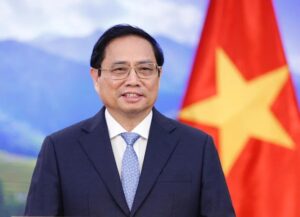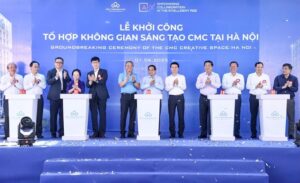Vietnam, China Pledge to Deepen Comprehensive Strategic Cooperation

Hanoi, The Gulf Observer: Party General Secretary Tô Lâm on Monday reaffirmed that the Vietnamese Party and State view the development of relations with China as an objective necessity, a strategic choice, and a foremost priority in Vietnam’s foreign policy.
The statement was made during high-level talks with General Secretary of the Communist Party of China’s Central Committee and President of China, Xi Jinping, following an official welcome ceremony in Hanoi. President Xi’s two-day State visit marks his fourth trip to Vietnam as China’s top Party and State leader, and his second during his current term.
General Secretary Lâm extended a warm welcome to the Chinese leader and his high-level delegation, whose visit coincides with the Vietnam–China Year of People-to-People Exchanges and the 75th anniversary of diplomatic ties between the two nations. He expressed confidence that the visit would serve as a significant milestone in advancing the comprehensive strategic cooperative partnership and building a Vietnam–China community with a shared future of strategic significance.
President Xi Jinping, in turn, noted that choosing Vietnam as the first destination of his 2025 overseas visits reflected the great importance that the Chinese Party and State attach to China–Vietnam relations. He expressed readiness to engage in in-depth discussions aimed at strengthening traditional ties, reinforcing strategic trust, and building a future-oriented relationship guided by the “six priorities”: political trust, defense-security cooperation, practical cooperation, social foundations, multilateral coordination, and dispute management.
During their talks, both leaders reviewed the progress of bilateral relations and discussed regional and international issues of mutual concern. They noted that recent years had witnessed remarkable advancements in Party-to-Party and state-to-state relations, with strengthened strategic exchanges and growing cooperation across multiple fields, especially trade, infrastructure, education, and local-to-local engagement.
Looking ahead, the two sides agreed to intensify regular high-level exchanges, elevate dialogue mechanisms between their respective foreign, defense, and public security ministries, and promote practical cooperation across sectors. They committed to establishing an inter-governmental committee to oversee railway cooperation and advance the timely implementation of the Lào Cai–Hà Nội–Hải Phòng railway project.
General Secretary Lâm also proposed that bilateral cooperation be expanded in digital transformation, scientific research, and technology, calling for balanced trade, greater investment in Vietnam by Chinese enterprises, and cooperation on environmental challenges such as air pollution in major cities like Hanoi.
He emphasized the need to cultivate the social foundation of bilateral ties by enhancing youth engagement and mutual understanding. He proposed organizing a theoretical seminar between the two Parties and expanding educational cooperation, particularly in strategic technologies and basic sciences.
President Xi, for his part, welcomed deeper exchanges on governance, and voiced strong support for aligning the Belt and Road Initiative with Vietnam’s “Two Corridors, One Belt” strategy. He committed to facilitating the entry of more Vietnamese goods into the Chinese market, boosting Chinese investment in Vietnam, and enhancing cooperation in key sectors such as 5G, artificial intelligence, semiconductors, and green development.
He announced China’s plan to invite Vietnamese youth to participate in the “Red Journey” programme over the next three years and pledged support for stronger cooperation under the Lancang–Mekong Cooperation framework.
Both sides reiterated their commitment to peacefully managing differences and maintaining regional stability. They agreed to promote the full and effective implementation of the Declaration on the Conduct of Parties in the South China Sea (DOC) and accelerate negotiations for an effective and substantive Code of Conduct (COC) in accordance with international law, including the 1982 United Nations Convention on the Law of the Sea (UNCLOS).
Following the talks, the two leaders reviewed and were briefed on 45 cooperation agreements signed across a wide range of sectors, including Party affairs, foreign relations, trade, transport, education, and local development.
As part of the visit’s broader diplomatic agenda, President Xi also held separate meetings with Prime Minister Phạm Minh Chính and National Assembly Chairman Trần Thanh Mẫn. In the evening, he attended a State banquet hosted in his honour by President Lương Cường.


